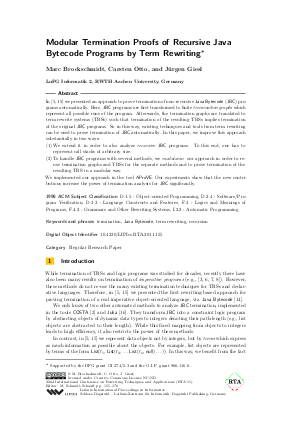Modular Termination Proofs of Recursive Java Bytecode Programs by Term Rewriting
Authors Marc Brockschmidt, Carsten Otto, Jürgen Giesl
-
Part of:
Volume:
22nd International Conference on Rewriting Techniques and Applications (RTA'11) (RTA 2011)
Part of: Series: Leibniz International Proceedings in Informatics (LIPIcs)
Part of: Conference: International Conference on Rewriting Techniques and Applications (RTA) - License:
 Creative Commons Attribution-NonCommercial-NoDerivs 3.0 Unported license
Creative Commons Attribution-NonCommercial-NoDerivs 3.0 Unported license
- Publication Date: 2011-04-26
File

PDF
LIPIcs.RTA.2011.155.pdf
- Filesize: 0.71 MB
- 16 pages
Document Identifiers
Subject Classification
Keywords
- termination
- Java Bytecode
- term rewriting
- recursion
Metrics
- Access Statistics
-
Total Accesses (updated on a weekly basis)
0PDF Downloads0Metadata Views
Abstract
In earlier work we presented an approach to prove termination of
non-recursive Java Bytecode (JBC) programs automatically. Here,
JBC programs are first transformed to finite termination graphs
which represent all possible runs of the program.
Afterwards, the termination graphs are translated to term
rewrite systems (TRSs) such that termination of the resulting TRSs
implies termination of the original JBC programs. So in this way,
existing techniques and tools from term rewriting can be used to
prove termination of JBC automatically. In this paper, we improve
this approach substantially in two ways:
(1) We extend it in order to also analyze recursive JBC programs.
To this end, one has to represent call stacks of arbitrary
size.
(2) To handle JBC programs with several methods, we modularize our
approach in order to re-use termination graphs and TRSs for the
separate methods and to prove termination of the resulting TRS
in a modular way.
We implemented our approach in the tool AProVE. Our experiments show
that the new contributions increase the power of termination analysis
for JBC significantly.
Cite As Get BibTex
Marc Brockschmidt, Carsten Otto, and Jürgen Giesl. Modular Termination Proofs of Recursive Java Bytecode Programs by Term Rewriting. In 22nd International Conference on Rewriting Techniques and Applications (RTA'11). Leibniz International Proceedings in Informatics (LIPIcs), Volume 10, pp. 155-170, Schloss Dagstuhl – Leibniz-Zentrum für Informatik (2011)
https://doi.org/10.4230/LIPIcs.RTA.2011.155
BibTex
@InProceedings{brockschmidt_et_al:LIPIcs.RTA.2011.155,
author = {Brockschmidt, Marc and Otto, Carsten and Giesl, J\"{u}rgen},
title = {{Modular Termination Proofs of Recursive Java Bytecode Programs by Term Rewriting}},
booktitle = {22nd International Conference on Rewriting Techniques and Applications (RTA'11)},
pages = {155--170},
series = {Leibniz International Proceedings in Informatics (LIPIcs)},
ISBN = {978-3-939897-30-9},
ISSN = {1868-8969},
year = {2011},
volume = {10},
editor = {Schmidt-Schauss, Manfred},
publisher = {Schloss Dagstuhl -- Leibniz-Zentrum f{\"u}r Informatik},
address = {Dagstuhl, Germany},
URL = {https://drops.dagstuhl.de/entities/document/10.4230/LIPIcs.RTA.2011.155},
URN = {urn:nbn:de:0030-drops-31146},
doi = {10.4230/LIPIcs.RTA.2011.155},
annote = {Keywords: termination, Java Bytecode, term rewriting, recursion}
}
